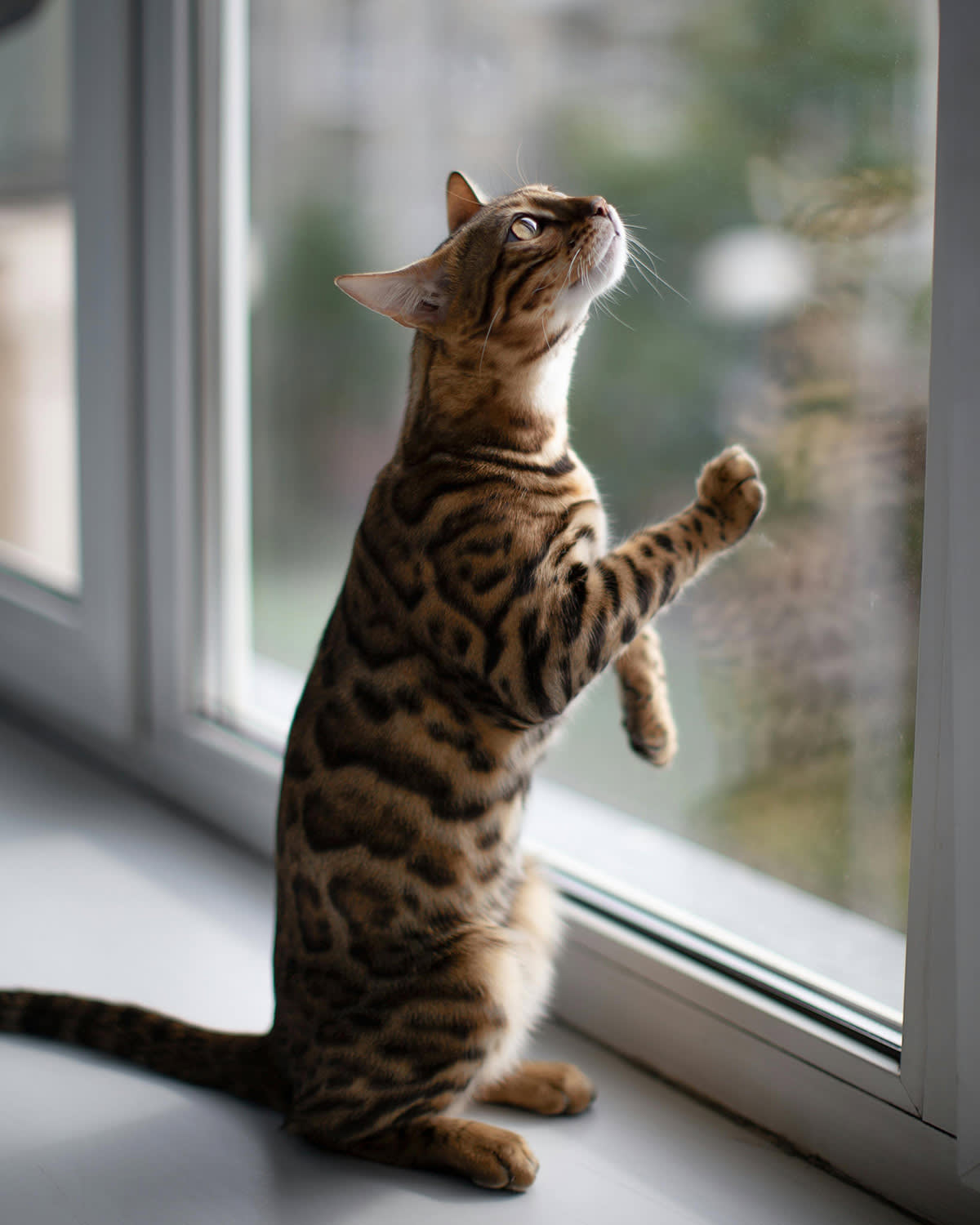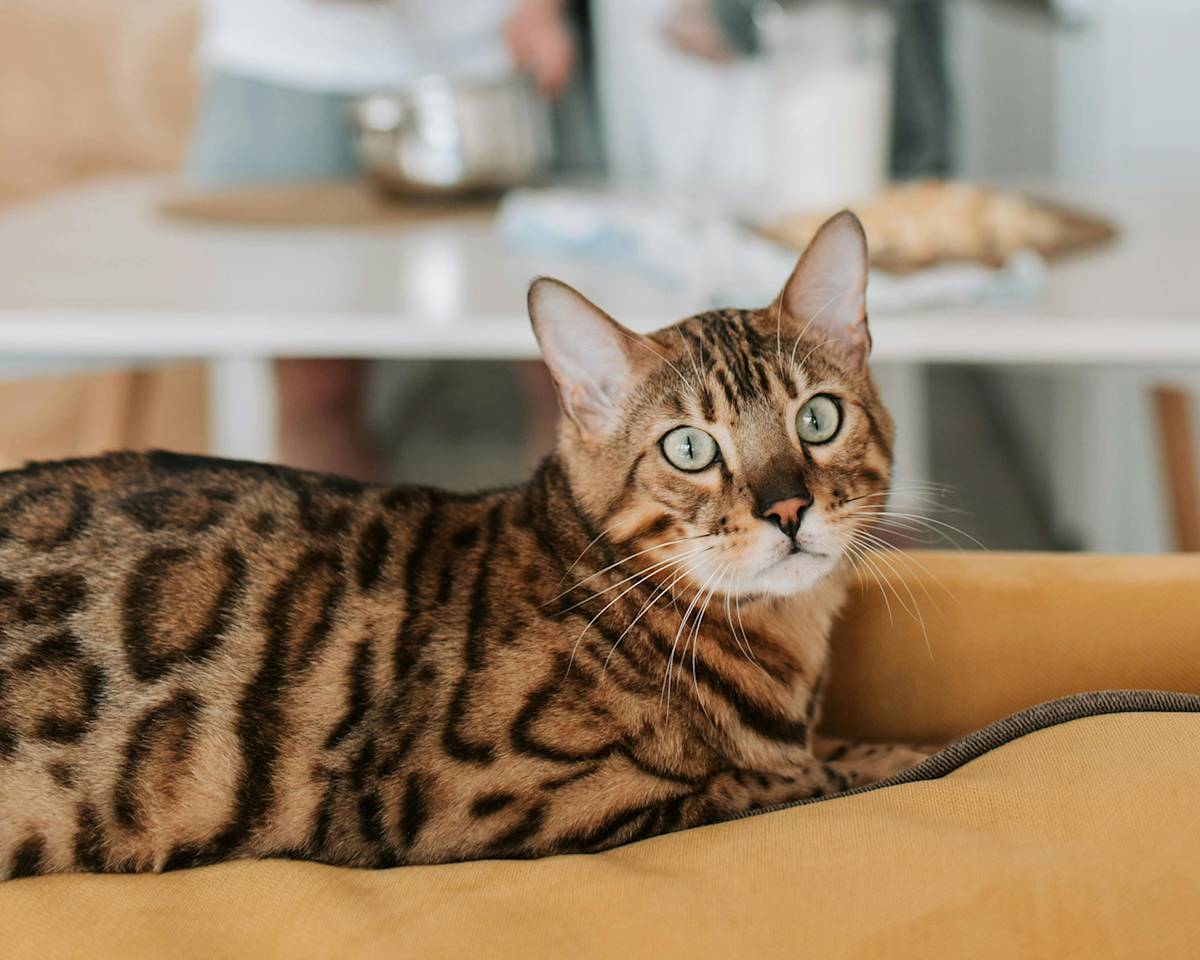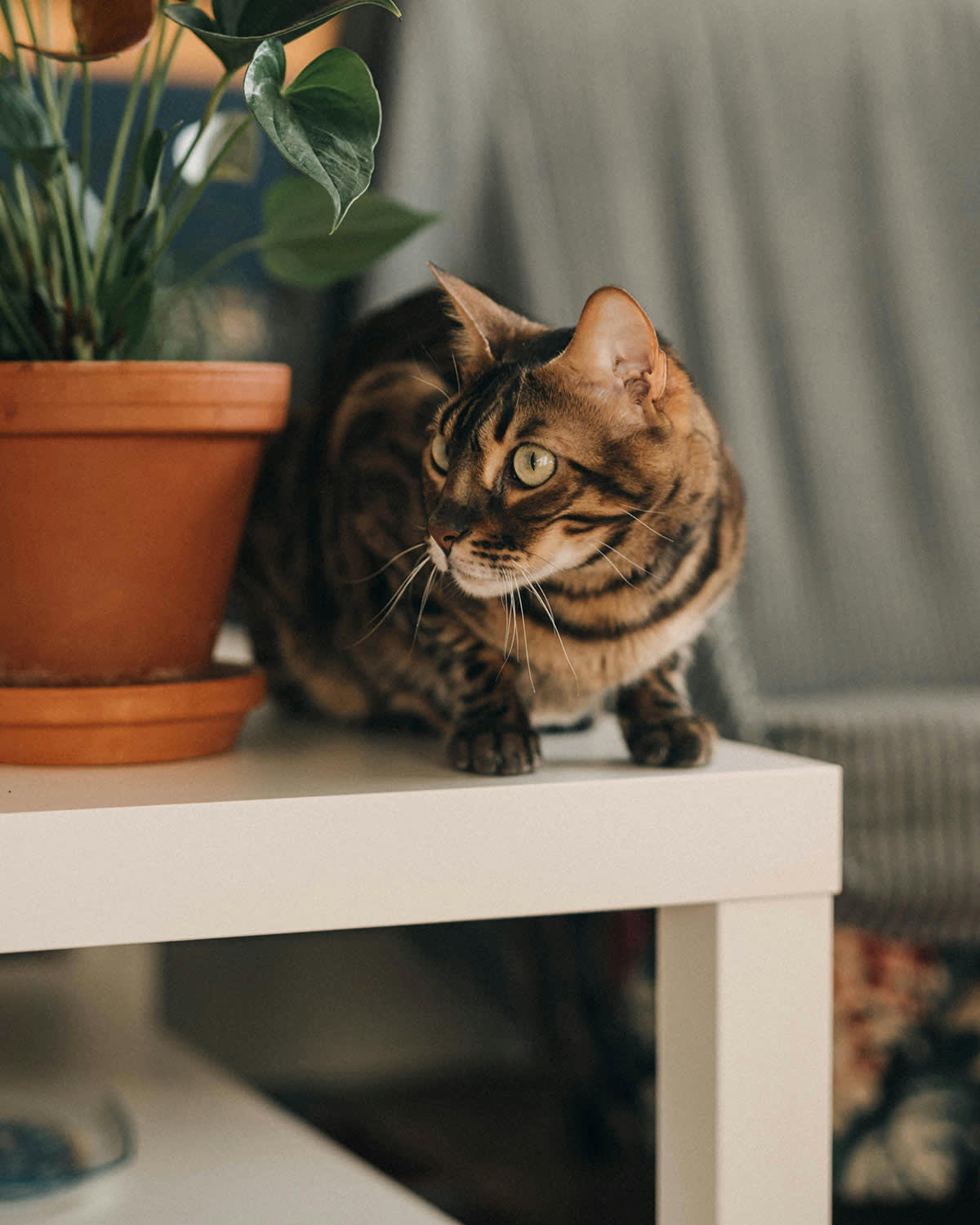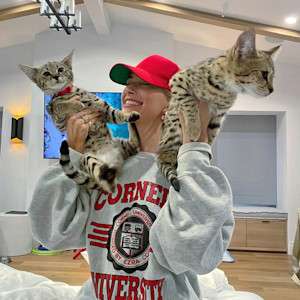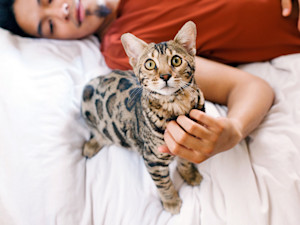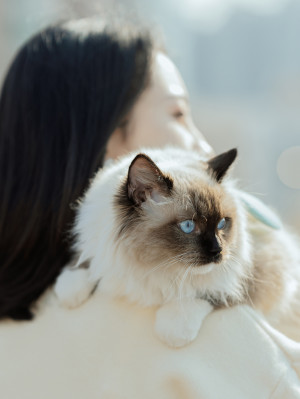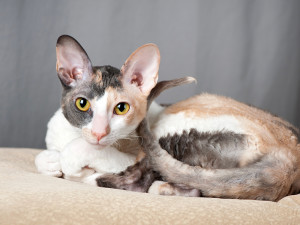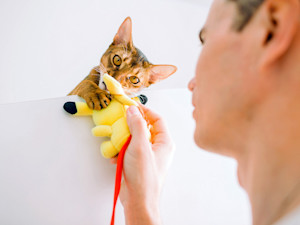Are Bengal Cats Legal In the UK?
Learn about why this beautiful cat is considered contraversial by some
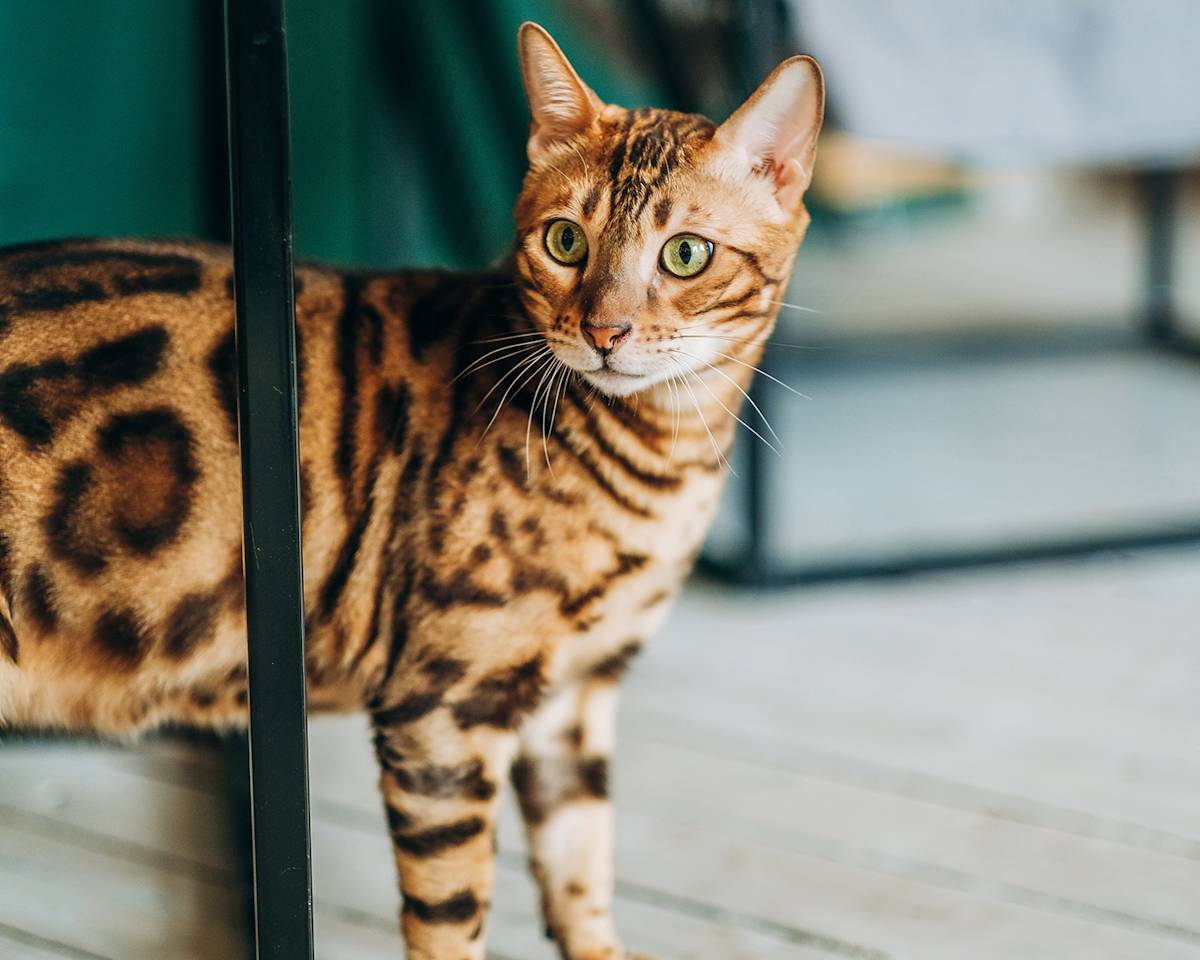
Share Article
In this article:
Bengal cats legal status in the UKopens in new tab Bengal cat restrictions historyopens in new tab Why Bengal cats are illegal in some countriesopens in new tab Consequences of illegal Bengal ownershipopens in new tab How to own a Bengal cat in the UKopens in new tab Bengal alternativesopens in new tab Bengal cat FAQsopens in new tab
The Bengal cat is a cross between a domestic cat and an Asian leopard cat, a small breed of wild cat. And while they are bee-a-utiful, with a stunning coat, their hybrid nature means they are genetically different to your regular moggy and having one can be something of a contentious issue.
Bengal cats are legal in the UK and increasingly popular, since they are now often as affordable as other pedigree breeds (and yes, we’ll say it again: they are very pretty). But their wild cat ancestry means that they are not always welcome. Some US states, including Hawaii and Connecticut, have banned the ownership of Bengal cats, while in others, like New York and Washington, they are heavily regulated. Earlier this year, Australia banned imports of Bengal cats.
In the UK, Bengal cats were regulated until 2007, when the Department for Environment, Food and Rural Affairs (DEFRA) removed licensing requirements, recognising them as domestic cats. So what’s all the controversy?
Legal status of Bengal cats in the UK
Bengal cats are legal in the UK. This wasn’t always they case. They were heavily regulated under the 1976 Dangerous Wild Animal Actopens in new tab. However, the removal of these regulations in 2007 meant that Bengal importation and ownership became much more accessible. Since then, many established Bengal cat communities have sprung up.
Historical context behind Bengal cat restrictions
Why does the UK recognise Bengals as domestic cats when other countries don’t? It’s all down to the breeding programme that created them. When Bengal cats were created by breeding domestic cats with Asian leopard cats, this was known as a first generation cross, called an F1. An F2 was then created using one F1 parent and one domestic cat, while an F3 kitten would have had one F2 parent and one domestic parent.
The UK cat community often refers to these first three generations of Bengal lineage as the ‘foundation’ generations. After this, kittens born as fourth generation and beyond are considered a domestic animal in the UK and officially a Bengal cat rather than a Leopard cat hybrid. Later generations of Bengals are considered domestic cats with an exotic appearance.
Lovers of the breed say the Bengal is intelligent, athletic and playful. From the fourth generation onwards the breeding of Bengals has produced a well-socialised family cat. A Bengal is happy to play with the family, including children and even the family dog. However, this does mean that a Bengal cat will need stimulation and isn’t the type of cat to spend all day napping.
But the exotic lineage of Bengal cats can present a complex problem internationally, and not every nation is ready to accept hybrid animals as pets. This is partly due to each nation’s approach to their own environmental and societal considerations, as well as how many generations removed from the original hybrid they believe it is before the cat can be domestic.
Why Bengal cats are illegal in some countries
Australia has always had strict measures to protect its delicate ecosystem. To prevent ecological imbalances, any introduction of non-native species, especially hybrids with wild ancestry, is closely monitored. Bengal cats – as lovely and as friendly as yours may be – can technically be classified as an ‘invasive species’, which means that as a non-native animal it could disrupt native ecosystems by outcompeting native species, altering habitats, and potentially introducing diseases to the local area.
In the past, Australia allowed Bengal cats to be imported into the country if they were five generations or more removed from their wild ancestor, with importers obligated to show supporting paperwork. But the continued concern over potential risks to local wildlife has now resulted in a complete import banopens in new tab. Thankfully, owners of Bengal cats already in the country are exempt from the new law and must only comply with any relevant state or territorial regulations.
Another concern that authorities might cite for banning certain animals and pets is infection. The monk seal is the only native breed of seal in Hawaii and is an endangered species. The leading cause of death for the monk seal is toxoplasmosis, a disease that can spread to waterways via cat faeces. Bengals, as well as domestic cats, can carry this infection. And since all cats that are allowed to roam – Bengals included – are a threat to the native bird and plant population, Hawaii has banned Bengal cats under the Plant Quarantine lawopens in new tab.
New York prohibits keeping most farm, wild and exotic animals as pets in the city and Bengal cats fall under the ‘exotic’ category there. Since the size, strength and wild instincts of ‘exotic’ animals could pose a threat, Bengal cats that are five generations removed from their wild ancestors (F5 Bengals) are not permitted within the confines of New York City, although they are allowed in the wider New York State. Although, a quick Google search for registered Bengal breeders operating in the city will give you some idea how strictly that law is enforced (not very!).
Consequences of owning Bengal cats illegally
If you live in an area that regulates ownership of exotic cat breeds and are considering a Bengal, do remember it’s your responsibility to check rules and regulations to see if you need a licence or if certain animals are banned. Laws can change, so if you’re moving, always check the most up-to-date local guidance too. You can’t rely on information provided by those selling cats, who may not be well informed or check the law in every location. In New York City, if a resident is found to be in possession of a Bengal, they may face fines, the confiscation of the cat and potential legal action.
How to become a Bengal cat owner in the UK
Responsible ownership of Bengals, like any pet, means understanding the breed’s unique personality and needs, as well as supporting ethical breeding practices. It is also crucial for potential owners to be aware of the legal rules of owning a Bengal cat in their specific region.
In the UK there are two dedicated Bengal breed clubs, The Bengal Cat Clubopens in new tab and The Bengal Cat Associationopens in new tab. These two sites should be your starting point to learn everything you can about the breed before committing to buying a cat. Both organisations maintain a breeder directory and kitten lists so you can work to ensure your breeder is ethical, and both have a dedicated welfare section to adopt a Bengal too.
Alternatives for Bengal cat lovers
If you’re looking for an alternative to the Bengal, there are plenty of other breeds to choose from. Think about why you were drawn to the Bengal and go from there. The Governing Council of the Cat Fancyopens in new tab has a full list of breeds here, you can compare coats, personality and care levels. The Ocicat and the Ocicat Classic have amazing coats like the Bengal, while the striking, bald, wrinkled look of the Sphynx cat might also appeal or perhaps the gentle giant Maine Coon cat could be your perfect pet. Alternatively, your local animal rescue centre is practically bursting at the seams with gorgeous and very loveable moggies who would love to find a safe home with a warm lap.
Bengal cats: frequently asked questions
Where are Bengal cats illegal?
Owning Bengal cats is illegal in some states in America, including Hawaii and Connecticut, while other states, like New York and Washington, regulate their ownership in certain cities or require specific paperwork. It’s illegal to import Bengal cats into Australia. Ireland restricts the import of Bengal catsopens in new tab to those of born five generations (F5) removed or more. The same is true of Singapore and Hong Kong where there is ban on the import of first to fourth generation Bengals, and cats of earlier generations are not allowed.
In Canada, Alberta regulates Bengal cat ownershipopens in new tab, the cat must be registered with The International Cat Association (TICA) as being an F4 generation or greater. Most other provinces accept Bengals as pets.
In Southland New Zealand, ownership of Bengal cats requires a permit, while they are banned completely on Stewart Island/Rakiura because of concern for native wildlife.
What is the problem with Bengal cats?
Some authorities consider Bengal cats a particular risk to ecosystems and native wildlife, either because of infections such as toxoplasmosis, because they may hunt and kill local species such as birds or because unneutered and free-roaming Bengals may mate and then dilute indigenous cat breeds. However, it can be argued that this is true for all cats, pedigree and recognised breed, or not.
There might also be concerns about behaviours connected to the wild nature of the Bengal’s lineage. However, many countries, the UK included, believe that by the fourth generation the Bengal is a domesticated cat.
Why are Bengal cats illegal in the UK?
Bengal cats are not illegal in the UK and all regulations on ownership were lifted in 2007. The British authorities are satisfied that Bengal cats have been sufficiently domesticated through breeding so as not to pose any more problems than any other breed of pet cat.
Why are Bengal cats not good pets?
Many people believe Bengal cats make good family pets because they have been sufficiently domesticated through a dedicated breeding programme. However, they are intelligent and active cats and will need stimulation, so they are not suitable for those that want a low-maintenance pet.
References
“ How to Bring Your Cat to Australia from a Group 2 Country - DAFFopens in new tab.” Agriculture.gov.au, 14 Mar. 2025. Accessed 13 June 2025.
“ Animal Quarantine Information Page (Updated)opens in new tab.” Hdoa.hawaii.gov.
“ The Dangerous Wild Animals Act 1976 (Modification) Order 2007.opens in new tab” Legislation.gov.uk, 2025. Accessed 13 June 2025.
Guidance on the Keeping of Ocelots, Asian Leopard Cats and Bengal Catsopens in new tab. 2004. Accessed 13 June 2025.
“ Wildlife as Petsopens in new tab.” Alberta.ca, 10 June 2025. Accessed 13 June 2025.
“Cat Breeds.” The Governing Council of the Cat Fancyopens in new tab.

Vanessa Holburn
Vanessa Holburn is a journalist whose work has featured in The Telegraph, The Express and The Mirror, as well as Wunderdog, Dogs Today, Bella and Fabulous magazines. She is also the author of How To Pick A Puppyopens in new tab and was part of the successful #LucysLaw campaignopens in new tab that banned puppies from being sold in pet shops. She's dog mum to Ziggy, a sofa-loving rescued Lurcher who does not like piña coladas and getting caught in the rain.
Related articles
![hailey bieber wears a red hat and holds two savannah cats]()
Wild Thing: Everything You Need to Know About Savannah Cats
Yes, they’re the supermodel of the cat world, but do they belong in your house?
![A bengal cat looking at the camera]()
From Bengals to Blues: The UK’s Most Expensive Cats Revealed
Meet the felines worth their weight in gold
![Dark-haired woman holding her ragdoll cat]()
7 Purebred Cat Breeds Likely to Suffer from Genetic Disorders
And why this means adopting a cat from a rescue centre could be a better choice
![Cornish Rex cat laying down on a pillow]()
The Cat Breed-Behaviour Connection
Which cats are more likely to have stranger danger? Bite the hand that feeds them? Get the zoomies? Scientists studied 5,700 pet cats and discovered some interesting traits
![cat playing with pikachu toy]()
Happy Cat, Happy Life: 5 Enrichment Tips to Keep Your Kitty Content
What is enrichment and why is it so important to keep your kitty happy?

